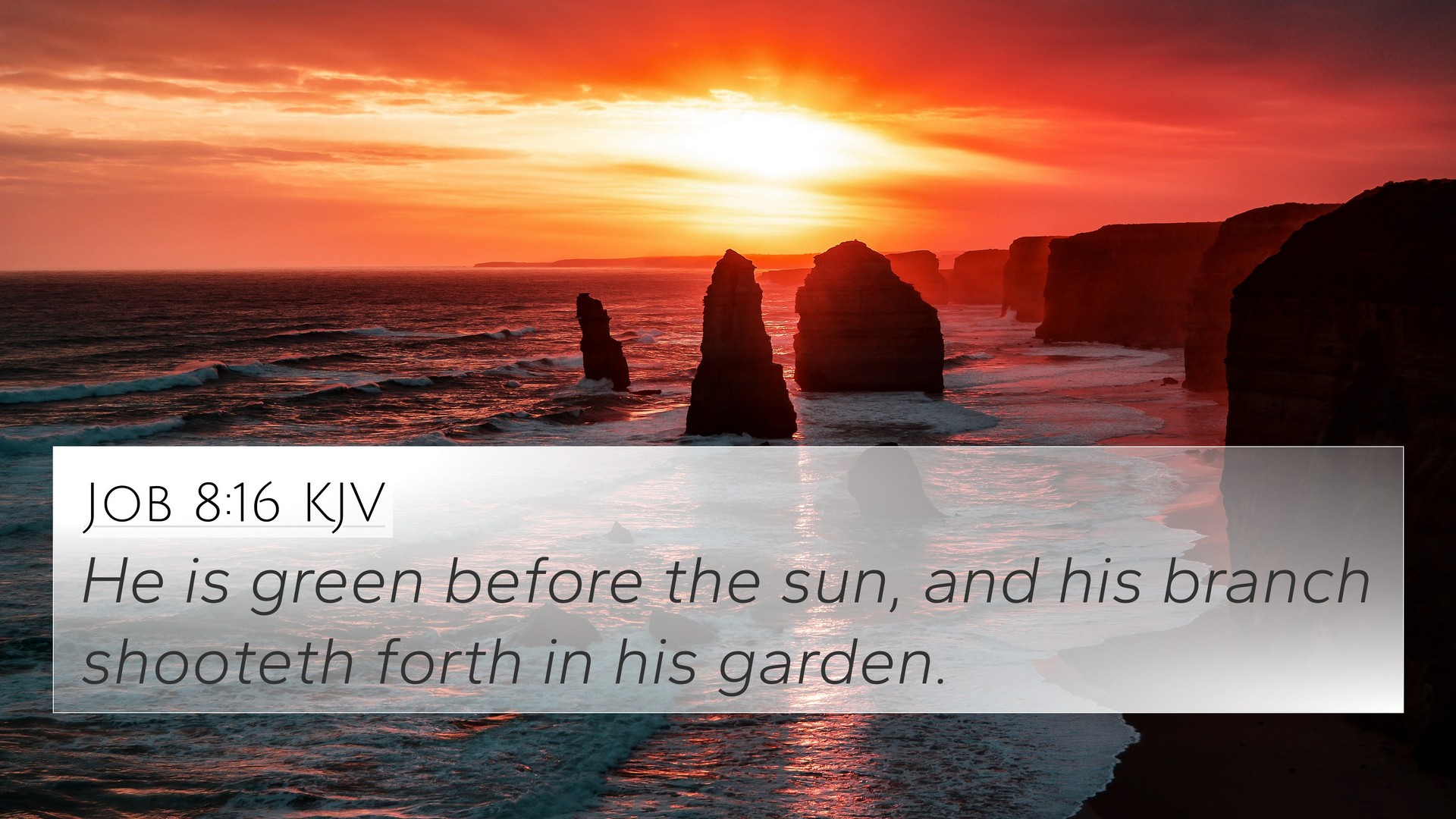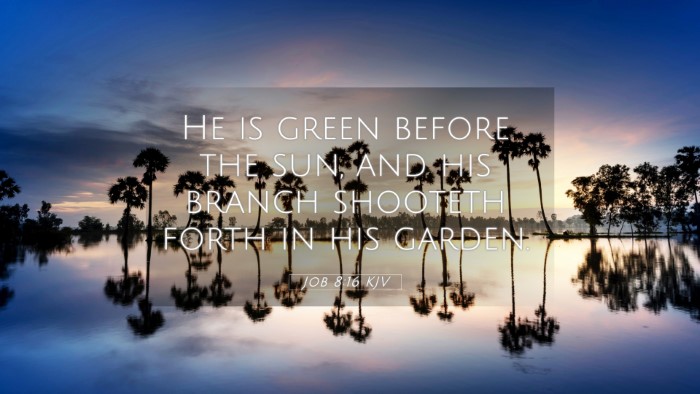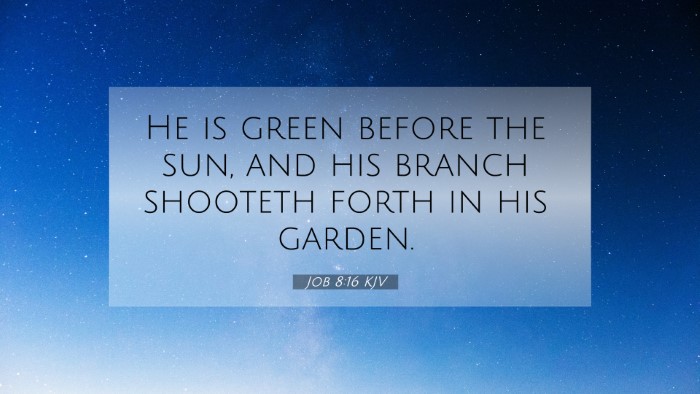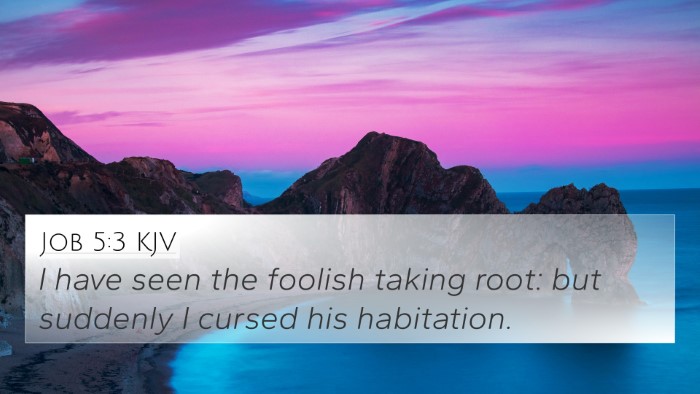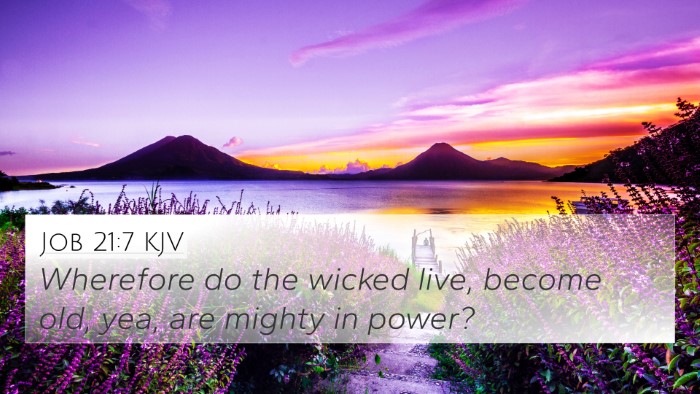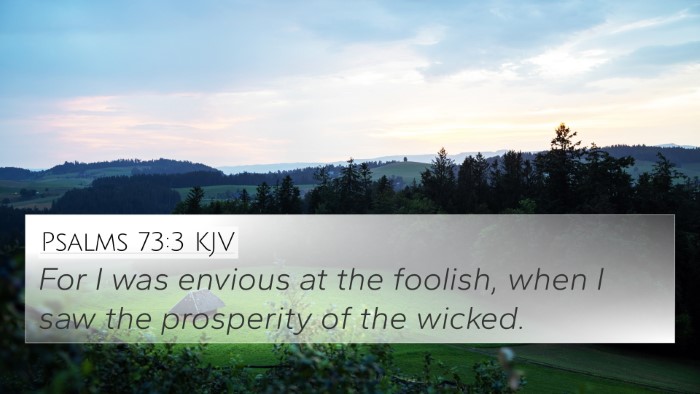Old Testament
Genesis Exodus Leviticus Numbers Deuteronomy Joshua Judges Ruth 1 Samuel 2 Samuel 1 Kings 2 Kings 1 Chronicles 2 Chronicles Ezra Nehemiah Esther Job Psalms Proverbs Ecclesiastes Song of Solomon Isaiah Jeremiah Lamentations Ezekiel Daniel Hosea Joel Amos Obadiah Jonah Micah Nahum Habakkuk Zephaniah Haggai Zechariah MalachiJob 8:16 Similar Verses
Job 8:16 Cross References
He is green before the sun, and his branch shooteth forth in his garden.
Uncover the Rich Themes and Topics of This Bible Verse
Listed below are the Bible themes associated with Job 8:16. We invite you to explore each theme to gain deeper insights into the Scriptures.
Job 8:16 Cross Reference Verses
This section features a detailed cross-reference designed to enrich your understanding of the Scriptures. Below, you will find carefully selected verses that echo the themes and teachings related to Job 8:16 KJV. Click on any image to explore detailed analyses of related Bible verses and uncover deeper theological insights.
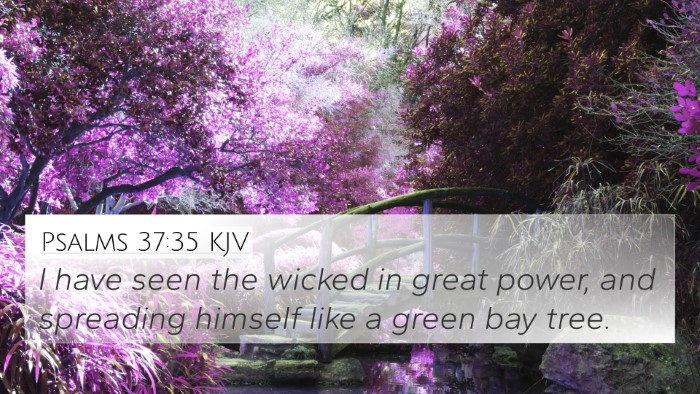
Psalms 37:35 (KJV) »
I have seen the wicked in great power, and spreading himself like a green bay tree.
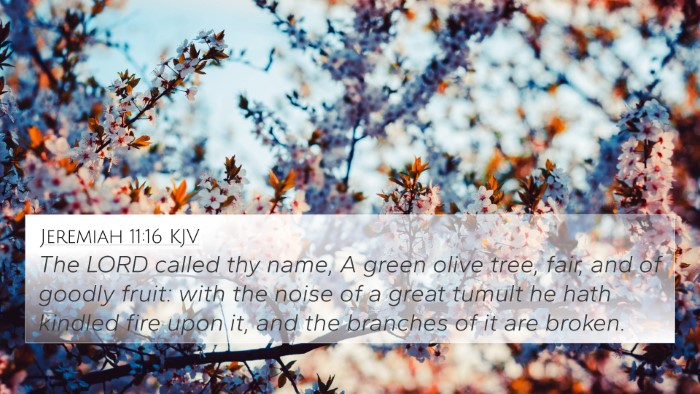
Jeremiah 11:16 (KJV) »
The LORD called thy name, A green olive tree, fair, and of goodly fruit: with the noise of a great tumult he hath kindled fire upon it, and the branches of it are broken.
Job 8:16 Verse Analysis and Similar Verses
Understanding Job 8:16
Job 8:16 (KJV): "He is green before the sun, and his branch shooteth forth in his garden."
In order to grasp the meaning of Job 8:16, we must look at the context of this verse within the Book of Job and analyze the themes presented in it. Eliphaz, one of Job's friends, speaks in this chapter, attempting to offer a perspective on Job's suffering. This verse is a metaphorical statement comparing the flourishing state of the wicked with the eventual downfall of the same. Below, we will explore insights and interpretations from various public domain commentaries.
Verse Context and Summary
Job 8 presents Eliphaz's argument that Job's suffering is a result of sin. He attempts to convince Job that God rewards the righteous and punishes the wicked. In verse 16, the imagery of a green plant thriving before the sun serves as a metaphor for those who may seem to prosper temporarily but ultimately face judgment.
Insights from Public Domain Commentaries
-
Matthew Henry:
Matthew Henry notes that the imagery used in this verse illustrates the peak of prosperity that the wicked can achieve. However, he argues that this prosperity is fleeting, emphasizing that even the most flourishing conditions are temporary and susceptible to God's judgment.
-
Albert Barnes:
Albert Barnes interprets the 'green before the sun' as an illustration of the transient nature of the wicked's success. He highlights how, like a plant that may seem flourishing, those who do not follow God will eventually wither away, especially when faced with divine scrutiny.
-
Adam Clarke:
Adam Clarke discusses the agricultural metaphor depicting the brief duration of prosperity among the wicked. He underscores that true flourishing belongs to those who trust in God, and the ultimate fate of the wicked is inevitable destruction, regardless of their current success.
Related Bible Cross-References
To deepen our understanding of Job 8:16, we can examine several Bible verses that relate to the themes of prosperity, judgment, and divine justice:
- Psalm 1:3: "And he shall be like a tree planted by the rivers of water..." - This contrasts the righteous with the wicked.
- Proverbs 10:30: "The righteous shall never be removed: but the wicked shall not inhabit the earth." - Emphasizing the stability of the righteous versus the wicked.
- Matthew 7:24-27: "Therefore, whosoever heareth these sayings of mine, and doeth them..." - The importance of building on a firm foundation in God.
- James 4:14: "For what is your life? It is even a vapor..." - The transient nature of life and success.
- Isaiah 40:7: "The grass withereth, the flower fadeth..." - The brevity of earthly prosperity.
- James 1:10: "But the rich, in that he is made low: because as the flower of the grass he shall pass away." - A reminder of the illusory nature of wealth.
- Job 14:2: "He cometh forth like a flower, and is cut down..." - A direct correlation with the theme of fleeting existence.
- Matthew 13:30: "Let both grow together until the harvest..." - The coexistence of the righteous and the wicked until final judgment.
- Galatians 6:7: "Be not deceived; God is not mocked: for whatsoever a man soweth, that shall he also reap." - The principle of divine justice and accountability.
- Psalm 37:2: "For they shall soon be cut down like the grass..." - Another affirmation of the temporary nature of the wicked's success.
Cross-Referencing Discussion
In the journey of understanding the connections between Bible verses, Job 8:16 serves as a pivotal piece in the theological discussion of sin, judgment, and the seeming prosperity of the wicked. By engaging in comparative biblical analysis, one can find profound insights into the nature of God’s justice as depicted throughout the scriptures.
Thematic Connections
By examining verses like Psalm 1:3 and Proverbs 10:30 alongside Job 8:16, we see consistent themes of divine favor resting on the righteous contrasted with the eventual downfall of the wicked. This thematic connection rooted in scriptural cross-referencing allows readers to comprehend the larger narrative of God’s ultimate sovereignty over human affairs.
Tools for Bible Cross-Referencing
Studying cross-references can greatly enhance a reader's understanding of biblical texts. Utilizing tools such as a Bible concordance or a cross-reference Bible study guide can provide an efficient means of locating similar themes and verses across the scriptures.
How to Use Bible Cross-References: When delving into a specific verse like Job 8:16, look for keywords or phrases that appear in parallel passages. Thematic Bible verse connections allow for deeper insights into how different parts of the Bible interrelate and complement each other's teachings.
Conclusion
Job 8:16 serves as a powerful reminder of the temporary nature of prosperity apart from God. Through cross-referencing and comparative analysis of related verses, a reader can better understand the implications of this verse within the broader context of Scriptural teachings on justice, righteousness, and divine oversight.
